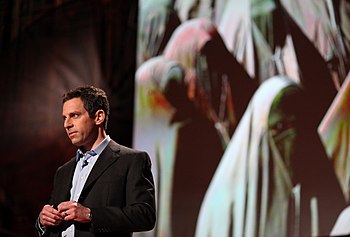| Sam Harris speaking in 2010 (Photo credit: Wikipedia) |
I don't think there is anything wrong with asking high-profile atheists to speak on various subjects of interest. What makes me uncomfortable about some of what I've seen has been the suggestion that when one of them declines the request or does not respond to it right away, some of those asking promptly declare that this makes them "part of the problem" or even misogynists. This strikes me as counterproductive.
Since this topic has already received so much attention, I'd like to pose a question in this post that does not seem to be getting nearly as much attention: are there good reasons to think that it would be helpful for Sam Harris or other high profile atheists to make statements condemning misogyny?
Would those sending misogynistic communications to Greta Christina stop doing so if they saw a tweet from Sam Harris condemning it? Does anybody really think that the sort of person sending rape threats or making other blatantly sexist or misogynistic comments online is going to be deterred by what Harris or anyone else says? Even if we assumed that such individuals were fans of Harris, this strikes me as extremely unlikely.

Okay, so this isn't necessarily about the misogynists changing in response to Harris' statement as much as it is about affecting the larger culture. That sounds far more reasonable to me. Harris and other "leaders" are viewed as being in a decent position to influence those around them, even if the influence won't realistically extend to those making the misogynistic comments. Fair enough.
Do Harris and other high-profile atheists necessarily share Greta's definition of what is "reprehensible" and/or her position that misogyny is a serious problem among atheists? If they were to believe, for example, that misogyny is no more common among atheists than among people in general, would it still be reasonable to expect them to make it as high a priority for their attention as Greta would like them to do? I think we can have different responses to this question without some of us necessarily being right and others being wrong. But set that all aside for now. Greta has every right to ask high-profile atheists to address issues that are important to her. We all do.

This idea of denying social consent is more interesting. How is this assumed to work? Perhaps Harris speaking out would help to turn people who are on the fence about misogyny to Greta's side and they would then be more likely to join her in shunning those she labels misogynists. Are there people on the fence about misogyny? Are there people who agree with Greta that misogyny is a problem worth addressing but disagree with much of how she proposes to solve it? And if some of those labeled misogynists are not misogynists at all but individuals who have expressed disagreement with some of Greta's views, what is to become of them?
When we see references to changing the culture and denying social consent, it seems like the use of social pressure (e.g., shunning, public shaming) is a big part of what we're talking about. If we can get Harris, Dawkins, and others to loudly and repeatedly condemn misogyny, it would send a clear message to everyone that is is unacceptable. If we can shame them into making the issue their top priority, eclipsing secularism, science, skepticism, and all else, our agenda would receive a considerable boost from their involvement. Wouldn't it be better to persuade these high-profile atheists so they actually begin to agree with us rather than shame them into issuing statements with which they might not even agree?
And since I think most people recognize that high-profile atheists issuing statements condemning misogyny is not going to be sufficient to produce the sort of cultural change we're after, this brings us back to the application of assorted forms of pressure. Pressuring high-profile atheists will not be enough; we'll also need to pressure everyone else. Doesn't the denial of cultural consent entail the marginalization of those who disagree with us through social pressure?
It seems to me that there are a variety of options available to those of us who are concerned with the presence of misogyny among atheists, skeptics, or any other group. Publicly browbeating high-profile individuals within the group on which one is focusing is certainly one such option. Calling people names when they express disagreement with one's viewpoint is another. Are these options effective? Do they run the risk into turning many potential allies away from one's stated cause? Are there better options? I suppose time will tell.
